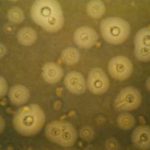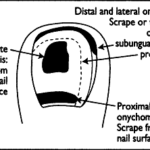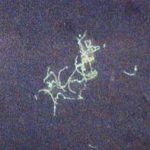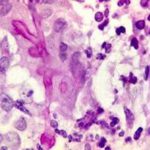Date: 26 November 2013
Secondary metabolites, structure diagram: Trivial name – Asterriquinone B1
Copyright: n/a
Notes:
Species: A. terreusSystematic name: 2,5-Cyclohexadiene-1,4-dione, 2-[2-(1,1-dimethyl-2-propenyl)-1H-indol-3-yl]-3,6-dimethoxy-5-[7-(3-methyl-2-butenyl)-1H-indol-3-yl]-Molecular formulae: C34H34N2O4Molecular weight: 534Chemical abstracts number: 78708-35-7Selected references: Arai, Kunizo; Masuda, Kikuo; Kiriyama, Noriki; Nitta, Keiichi; Yamamoto, Yuzuru; Shimizu, Sakae (Fac. Pharm. Sci., Kanazawa Univ., Kanazawa 920, Japan). Chem. Pharm. Bull., 29(4), 961-9 (English) 1981.
Images library
-
Title
Legend
-
BAL specimen showing hyaline, septate hyphae consistent with Aspergillus, stained with Blankophor
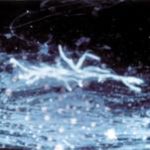
-
Mucous plug examined by light microscopy with KOH, showing a network of hyaline branching hyphae typical of Aspergillus, from a patient with ABPA.
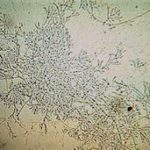
-
Corneal scraping stained with lactophenol cotton blue showing beaded septate hyphae not typical of either Fusarium spp or Aspergillus spp, being more consistent with a dematiceous (ie brown coloured) fungus
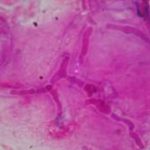
-
Corneal scrape with lactophenol cotton blue shows separate hyphae with Fusarium spp or Aspergillus spp.
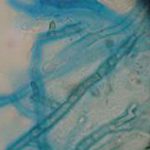
-
A filamentous fungus in the CSF of a patient with meningitis that grew Candida albicans in culture subsequently.
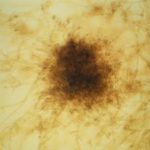
-
Transmission electron micrograph of a C. neoformans cell seen in CSF in an AIDS patients with remarkably little capsule present. These cells may be mistaken for lymphocytes.
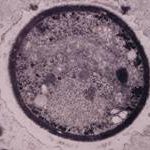
-
India ink preparation of CSF showing multiple yeasts with large capsules, and narrow buds to smaller daughter cells, typical of C. neoformans
